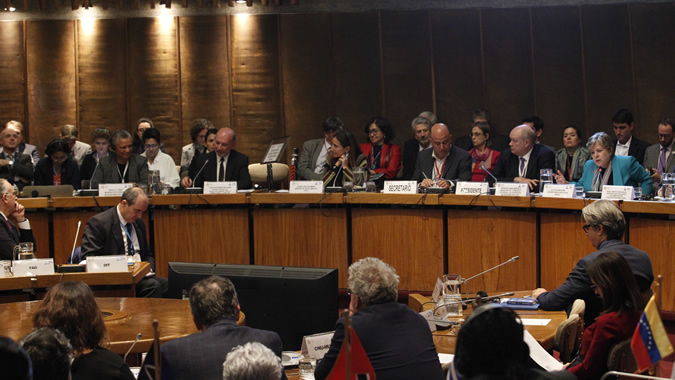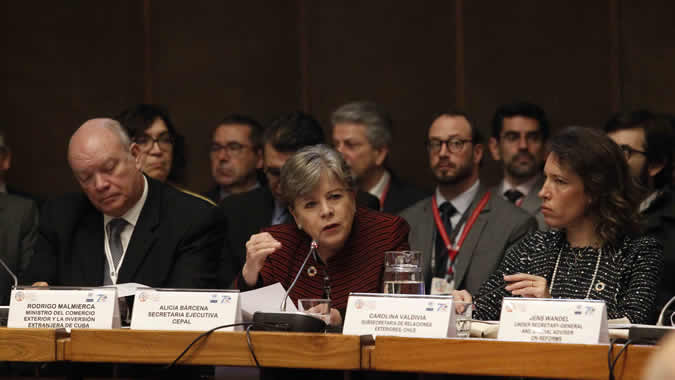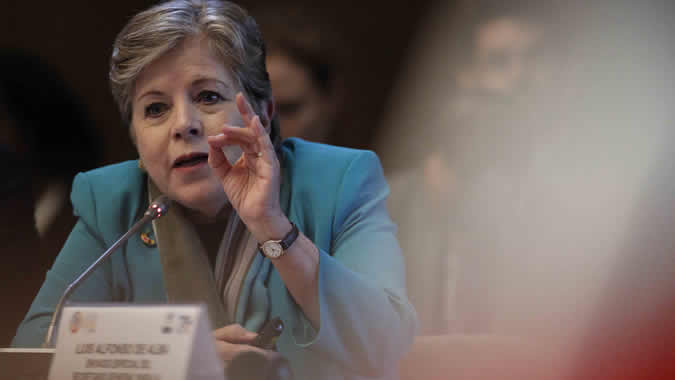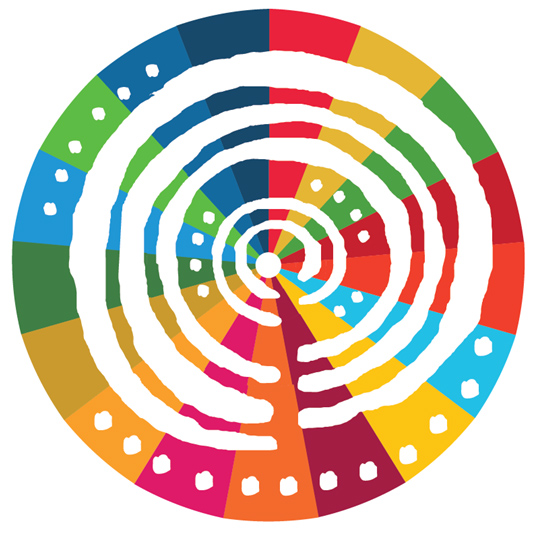Countries Recognize the Forum of the Countries of Latin America and the Caribbean on Sustainable Development as an Example of Coordination and Follow-up of the 2030 Agenda in the Region
Work area(s)
On Friday, April 26, the third meeting of the regional gathering concluded at ECLAC’s headquarters in Santiago, Chile, having drawn more than 1,000 representatives of government, civil society and international organizations.

The region’s countries recognized the Forum of the Countries of Latin America and the Caribbean on Sustainable Development as an example of regional coordination among multiple stakeholders, such as governments, the United Nations system, the private sector, academia and civil society, to carry out implementation of the 2030 Agenda for Sustainable Development in Latin America and the Caribbean, upon concluding the third meeting of the regional mechanism this Friday, April 26, at ECLAC’s headquarters in Santiago, Chile.
The high-level event – organized by the Economic Commission for Latin America and the Caribbean (ECLAC) and the government of Cuba, in its capacity as president of the regional organization – was attended by more than 1,000 people, including 153 delegates from 33 countries, 25 of them from the region, as well as 20 representatives of United Nations agencies, funds and programs and 18 envoys from intergovernmental bodies. The majority of all the attendees were women (51% versus 49% of men).
The closing events included a special session entitled “Towards the General Assembly 2019,” in which the participants were Alicia Bárcena, ECLAC’s Executive Secretary; Carolina Schmidt, Minister of the Environment of Chile; Luis Alfonso de Alba, Special Envoy of the Secretary-General for the 2019 Climate Summit; Rubén Armando Escalante Hasbún, Ambassador Extraordinary and Plenipotentiary and Permanent Representative of El Salvador to the United Nations (via video message); María Fernanda Espinosa, President of the seventy-third session of the United Nations General Assembly (via video message); Sheila Gweneth Carey, Permanent Representative of the Bahamas to the United Nations, in her capacity as co-facilitator of the political declaration of the High-level Political Forum on Sustainable Development; and Rodrigo Malmierca, Minister of Foreign Trade and Foreign Investment of Cuba, in his capacity as Chair of the Forum of the Countries of Latin America and the Caribbean on Sustainable Development.
In her remarks, Minister Schmidt detailed the main objectives of the 25th Conference of the Parties on Climate Change (COP 25), which will take place next December in Santiago, indicating that ambition and climate action will be its main points. “If we do not act more quickly, the consequences of climate change for the planet will be irreversible,” she said. She added that Latin America and the Caribbean must be capable of carrying out joint endeavors at the conference to advance on concrete climate action. “We need the will of all parties to make progress on this task,” she stated.
Luis Alfonso de Alba reiterated that there is a need to move from negotiation to action, in order to leap forward on climate matters. “The United Nations Secretary-General, António Guterres, has insisted that Heads of State go to the Climate Summit that will be held in September with a concrete plan, not just speeches,” he said. “To carry forward the climate agenda, it is indispensable that other actors get more involved, especially civil society and the private sector.”
In his video message, Ambassador Escalante described the calendar of upcoming high-level meetings for follow-up on the 2030 Agenda and climate action that will take place in September in New York, which include a special session of the High-level Political Forum (HLPF) at the level of Heads of State and Government, the Climate Summit, the High-level Dialogue on Financing for Development, and the review of the SAMOA Pathway for small island developing States.
Meanwhile, the President of the General Assembly, María Fernanda Espinosa, underscored in her video message the relevance of ECLAC’s work and its permanent support for the development of Latin American and Caribbean countries. “We must continue strengthening this UN regional commission. It plays a crucial role for cooperation between countries,” she indicated.
“Moving toward a more prosperous, inclusive and sustainable region requires redistributive fiscal policies, combined with external financing. The COP 25 and the 2019 Climate Summit are opportunities to strengthen the mechanisms agreed upon in the Paris Agreement, and to ramp up ambition for achieving the 2030 Agenda,” Espinosa added.
In her remarks, the Ambassador of the Bahamas, Sheila Gweneth Carey, stated that the 2030 Agenda requires the participation of all relevant actors. “At the United Nations High-level Political Forum on Sustainable Development, we will review the progress made on this road map. We must ensure the greatest level of participation. The stakes are high and the entire world is watching us,” she said.
Minister Rodrigo Malmierca thanked ECLAC for organizing the Forum and thanked all the delegates for their enthusiastic and fruitful participation. “This third Forum has been very significant, since we have discussed all the issues, upholding the principle of ‘leaving no one behind’ and putting the Caribbean first, just as ECLAC has indicated. You are all invited to the fourth meeting in Havana, in April 2020,” he said.
Upon concluding the gathering, ECLAC’s Executive Secretary expressed her satisfaction with the debates held over the past five days. “It has been a very enriching week, full of commitments. We know that we face challenges, such as expanding the spaces for participation. Today, more than ever, we are committed to working on this civilizing and indivisible agenda known as the 2030 Agenda,” she indicated.
“We leave the Forum of the Countries of Latin America and the Caribbean on Sustainable Development held this week at ECLAC with the clarity that the territory matters and that it is necessary to take the Agenda to the people, to children, to adolescents, indigenous persons, to all men and all women,” Bárcena sustained.
In the final document with the Intergovernmentally agreed conclusions and recommendations of the third meeting of the Forum of the Countries of Latin America and the Caribbean on Sustainable Development, the delegates commend the 19 countries of the region that have already presented voluntary national reviews at the series of ministerial sessions of the High-level Political Forum under the auspices of the Economic and Social Council, and the 5 countries preparing to do so in 2019.
They also welcome the outcome document of the Second High-Level United Nations Conference on South-South Cooperation (BAPA+40), held last March in Buenos Aires, and commit to its implementation, while reiterating the important contribution of South-South and triangular cooperation to the implementation of the 2030 Agenda.
In addition, they express appreciation for the Quadrennial report on regional progress and challenges in relation to the 2030 Agenda for Sustainable Development in Latin America and the Caribbean, prepared jointly by ECLAC and the regional offices of funds, programs and specialized organizations of the United Nations system.
Related event
Related content

Forum of the Countries of Latin America and the Caribbean on Sustainable Development Begins with a Call to Strengthen Multilateralism and Regional Cooperation
The third meeting of the gathering was inaugurated today at ECLAC’s headquarters in Santiago, Chile, with the presence of representatives from all the region’s countries.

Forum of the Countries of Latin America and the Caribbean on Sustainable Development: An Example of Multilateralism and Regional Cooperation
Op-ed by Alicia Bárcena, ECLAC’s Executive Secretary.

Fulfillment of the 2030 Agenda in Latin America and the Caribbean is at a Critical Point: Alicia Bárcena
ECLAC’s Executive Secretary presented an analysis of the implementation of the Sustainable Development Goals (SDGs) during the Forum of the Countries of Latin America 2019.
Related link(s)
Country(ies)
- Latin America and the Caribbean
Contact
Public Information Unit
- prensa@cepal.org
- (56 2) 2210 2040
